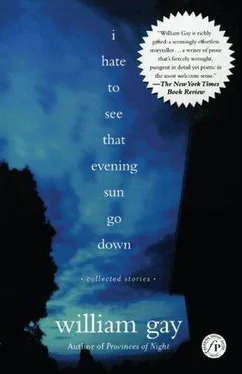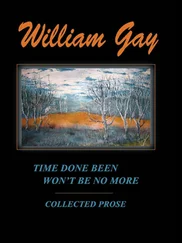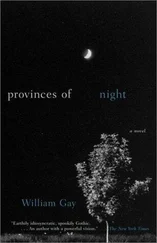The hot clammy flesh was distasteful to his naked body but Scribner had never been one to shirk what had to be done. With Rabon’s face clasped to his breast and his powerful arms locked in a vise that tightened, they looked like perverse lovers spending themselves on the flowered carpet.
When Rabon was still the old man got up, pushing himself erect against Rabon’s slack shoulder. He went out the bedroom door and through a room where a television set flickered, his passage applauded by canned laughter from the soundtrack, and so out into the night.
Night air cool on his sweaty skin. A crescent moon like a sliver of bone cocked above the treeline, whippoorwills calling out of the musky keep of the trees. He stood for a moment sensing directions and then he struck out toward the whippoorwills. He went down into the hollow through the herd of plywood cattle pale as the ghosts of cattle and on toward the voices that called out of the dark. He came onto the spectral roadbed and crossed into deeper woods. The whippoorwills were drawing away from him, urging him deeper into the shadowed timber, and he realized abruptly that the voices were coming from the direction of Brown’s Ferry or Deep Elm. Leaning against the bole of a white oak to catch his breath he became aware of a presence in the woods before him, and he saw with no alarm that it was a diminutive man in a green plaid suit, derby hat shoved back rakishly over a broad pale forehead, gesturing him on with a malacca cane.
They’re up here, the little man called.
Scribner went on, barefoot, his thin pajama bottoms shredding in the undergrowth of winter huckleberry bushes. Past a stand of stunted cedars the night opened up into an enormous tunnel, as wide and high as he could see, a tunnel of mauveblack gloom where whippoorwills darted and checked like bats feeding on the wing, a thousand, ten thousand, each calling to him out of the dark, and he and the man with the malacca cane paused and sat for a time against a tree trunk to rest themselves before going on.
D ID YOU HAVE TO scrub the blood off the walls? Karas asked her. Was the water pink when you squeezed the sponge out? Did you vacuum bits of bloody tissue out of that ugly shag carpet?
In a fever dream that was almost but not quite nightmare Karas asked the Storm Princess those questions, then abruptly realized that he had in actuality asked them this very morning, watching her face intently as he spoke, looking deep into her eyes to see if anything changed in their depths.
What in the world are you doing back here? a voice asked.
Karas thought at first the voice was inside his head. One character in his dream speaking to another, but when the voice came again he judged it behind him and slowly opened his eyes.
He was lying somewhere on his back. The first thing he saw was the tall Ron Rico rum bottle he was clasping erect on his abdomen and from which he had apparently been sipping from time to time. He saw his feet, polished brown loafers, his legs crossed at the ankles and protruding from the passenger-side window of the Grand National. His head was protruding from the opposite window for he could feel the window frame hard against the back of his neck.
What are you doing?
Beyond his feet Karas could see riotous summer greenery, a sunlit wall of rock, the trunks of trees. A squirrel ran along a shelf of limestone and vanished up the bole of a cypress. A cardinal shot across the emerald undergrowth, abrupt and startling as a spatter of blood. A bobwhite called, and he closed his eyes for a time and listened, amusing himself with explanations he might offer whoever was standing behind him and holding him accountable for driving the pristine Grand National he had restored far into the woods where there had not even been a road to follow. Waiting for deer season to open, he thought. Took a left at that last traffic light and goddamn, where is this place? Supposed to meet the devil here around midnight and interview him about Robert Johnson.
I about thought you was dead, the voice said. You ain’t are you?
The thought of the Storm Princess, the wife who had fled him, suddenly jolted him clear of all this nonsense. It suddenly occurred to him that he was alive, and he had not expected to be. He raised his left arm and studied the inside of his wrist. A red scratch perhaps an inch and a half long. No more damage than you might do with the end of a paper clip. Either the penknife he had found in the glove box had been duller than expected or he had suffered a severe breakdown in the nerve department. He figured it was some of both, and withdrew his feet from the window and sat up in the driver’s seat. He drank from the Ron Rico bottle and lowered it and sat clasping it loosely between his thighs.
There was a little man standing patiently beside his car. Karas glancing his way judged him some sort of woodsprite or gnome or some such nature spirit but when he turned and drank from the bottle then looked back the little man was still there.
What are you doing in here? the man asked.
I’m writing a book about Robert Johnson, Karas said.
The little man wore a peaked green hat with a long trailing cock feather of the sort Alpine mountain climbers might favor and Karas supposed that was why he had taken him for some sort of elf. Beyond the man the sun was slant in the trees with its rays harsh and oblique and Karas could tell that the day was waning and that he had drunk and dozed it practically away.
I don’t believe I know any Johnsons in these parts, the man said. Do you always write in the middle of the woods?
Robert Johnson was a blues singer and guitarist who died a long time ago in the Mississippi Delta, Karas said, and fell silent, unable to go on, unable to talk, unable to think about anything save the Storm Princess.
She had been gone for three weeks, and when Karas had knocked on the front door of the trailer she had fled to that morning, not even waiting for decent daylight, he had been just drunk enough to believe that she would climb joyfully into the front seat of the Grand National and ride away with him: it had been a long three weeks, and it should have reduced her to a compliant state of loneliness.
I’m having a little trouble handling this, he told her.
She had a hand on the door, waiting to close it. Well, you’re just going to have to handle it, she said. There was a hard-edged quality of finality about her that he was unaccustomed to. There was little evidence of loneliness and none of compliancy, and the phrase Karas had been about to utter, We can pretend this separation never happened, was stuck in his mind like something he had no use for.
I just wanted to talk to you.
There’s nothing to talk about, she said. Sublimate it, channel it, write it into one of your books. Isn’t that supposed to be good therapy? And why are you drunk? You never drink. Why are you acting like such a fool about this?
Well, I didn’t set out to act like a fool about it, he said. It sort of happened to me a little at a time.
He stood for a moment before the door that was barred only by her slender forearm, the bottle slung at his side like a sample case. He felt like a salesman hawking some dread wares no one wanted anything whatever to do with. I want you back, he said, knowing the instant the words left his tongue how inadequate and worthless they were. There was no way to tell her. He had been half of two and now he was one, bloody and illy used, a Siamese twin set upon with a chopping ax.
I never mistreated you, he said.
You mistreated me every day for fifteen years, she said. You only wanted me around when you wanted to go to bed with me. The rest of the time you wanted me out of your way. The mystery is why it took me so long to make this move.
Читать дальше












